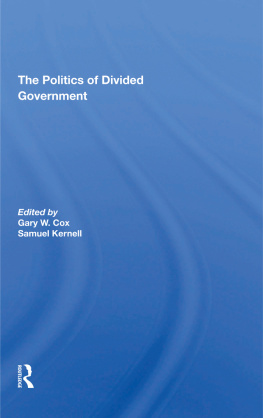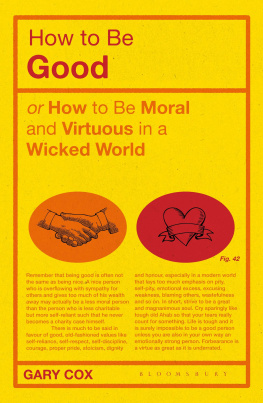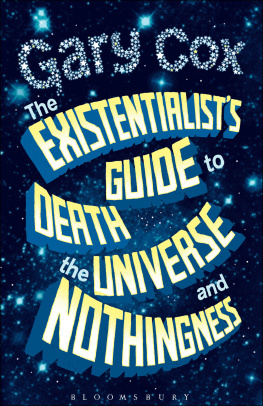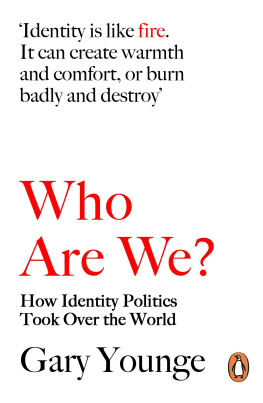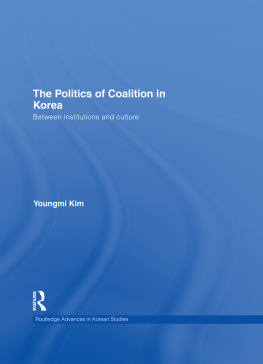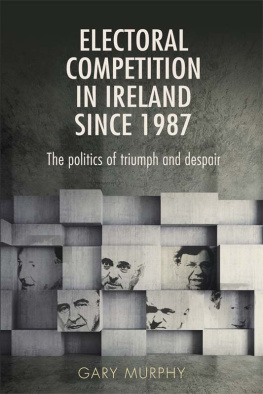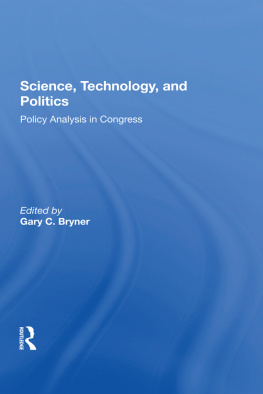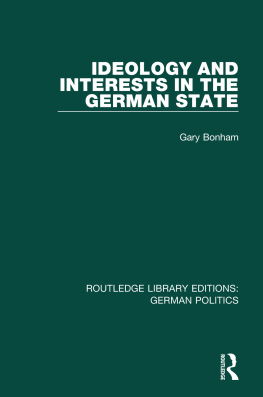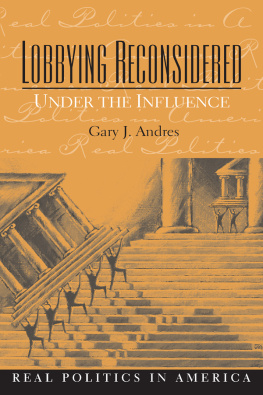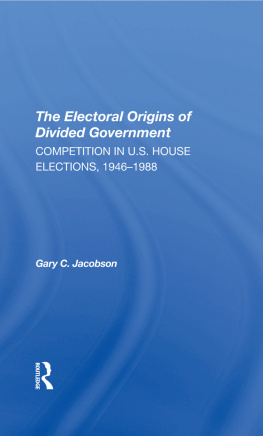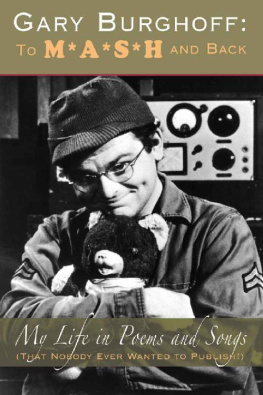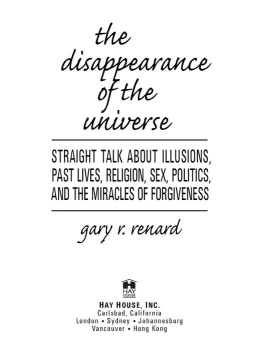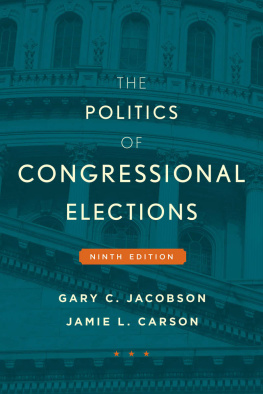THE POLITICS OF DIVIDED GOVERNMENT
THE POLITICS OF DIVIDED GOVERNMENT
EDITED BY
GARY W. COX
University of California, San Diego
SAMUEL KERNELL
University of California, San Diego
First published 1991 by Westview Press
Published 2019 by Routledge
52 Vanderbilt Avenue, New York, NY 10017
2 Park Square, Milton Park, Abingdon, Oxon OX14 4RN
Routledge is an imprint of the Taylor & Francis Group, an informa business
Copyright 1991 by Taylor & Francis
All rights reserved. No part of this book may be reprinted or reproduced or utilised in any form or by any electronic, mechanical, or other means, now known or hereafter invented, including photocopying and recording, or in any information storage or retrieval system, without permission in writing from the publishers.
Notice:
Product or corporate names may be trademarks or registered trademarks, and are used only for identification and explanation without intent to infringe.
Library of Congress Cataloging-in-Publication Data
The politics of divided government / edited by Gary W. Cox, Samuel
Kernell.
p. cm.
Includes bibliographical references and index.
ISBN 0-8133-1145-4 (alk. paper). ISBN 0-8133-1144-6 (pbk.:
alk. paper)
1. Party affiliationUnited States. 2. Political partiesUnited
States. 3. United StatesPolitics and government1945- . I. Cox,
Gary W. II. Kernell, Samuel, 1945- .
JK2261.P67 1991
324.973dc20 91-20269
CIP
ISBN 13: 978-0-367-29509-7 (hbk)
To Our Parents
Editors of books such as this one invariably incur substantial debts. The bulk of the funds for this project was provided by Westview Press and the University of California, San Diego (UCSD), the latter money being funneled through the offices of Harold Ticho (vice chancellor for academic affairs), Michael Rothschild (dean of social sciences), Paul Drake (chairman of the Department of Political Science), and Samuel Kernell (coordinator of the American Political Institutions Project). Three members of the facultyGary Cox, Gary Jacobson, and Mat McCubbinswere also financial contributors. We owe a special debt of gratitude to Mat McCubbins and Gary Jacobson, who helped conceive and organize the project.
We must also thank Jane Weber at the American Political Institutions Project, UCSD, without whose organizational skills the whole project would have been lost in transit between the editors or in one or both of their offices; Jennifer Knerr, our editor at Westview Press, who has been uniformly efficient and helpful in shepherding the book through production; and, finally, the Republican and Democratic parties, without whose constant competition and differential success this volume would never have been conceived.
Gary W Cox
Samuel Kernell
Gary W. Cox is professor of political science at the University of California, San Diego. In addition to writing numerous articles, he is the author of The Efficient Secret , a study of the development of political parties and political institutions in Victorian England, and coauthor of a forthcoming study of parties in the U.S. Congress, Parties and Committees in the U.S. House .
Morris P. Fiorina is professor of government at Harvard University and former chairman of the Board of Overseers of the National Election Study. In the area of electoral behavior he is author of Retrospective Voting in American National Elections and coauthor of The Personal Vote: Constituency Service and Electoral Independence . The latter won the 1988 Richard F. Fenno Prize for the best book on legislative studies.
Gary C. Jacobson is a professor of political science at the University of California, San Diego. His recent books include The Electoral Origins of Divided Government and the third edition of The Politics of Congressional Elections .
Samuel Kernell is professor of political science and coordinator of the American Political Institutions Project at the University of California, San Diego, He has authored and edited numerous books and articles, most recently Going Public: New Strategies of Presidential Leadership and Parallel Politics: Economic Policymaking in Japan and the United States .
Mathew D. McCubbins is a professor of political science at the University of California, San Diego. He is the coauthor of The Logic of Delegation: Congressional Parties and the Appropriations Process and a forthcoming book, Parties and Committees in the U.S. House .
John R. Petrocik is a professor of political science at the University of California, Los Angeles. His books include The Changing American Voter (with Norman H. Nie and Sydney Verba) and Party Coalitions: Realignment and the Decline of the New Deal Party System . Currently, he is writing a book on issue ownership of the political parties.
Charles H. Stewart III is the Cecil and Ida Green Career Development Associate Professor of Political Science at the Massachusetts Institute of Technology. He is the author of Budget Reform Politics and several articles on the history of Congress, budget reform, fiscal policy, and congressional elections. His current research concerns the modernization of the House after the Civil War and the consequences of divided government in the late nineteenth century.
Martin P. Wattenberg is professor of political science at the University of California, Irvine. He is the author of The Decline of Political Parties, 1952-1988, as well as The Rise of Candidate-Centered Politics: Presidential Elections of the 1980s . Professor Wattenberg currently is working on a project comparing U.S. and German electoral behavior.
1
INTRODUCTION: GOVERNING A DIVIDED ERA
Gary W. Cox and Samuel Kernell
With rampant inflation and widespread labor unrest following on the heels of the decontrol of the wartime economy, in the fall of 1946 political observers agreed that President Harry Truman's Democrats would do poorly in the upcoming congressional elections. Few, however, appreciated just how severe the backlash against this long-standing incumbent party would be or predicted that the Republicans would take control of Congress. Politicians and pundits alike were unprepared to deal with divided party control of Congress and the presidency. The election returns, however, brought both face to face with just that situation.
Collective consternation over the prospect of divided government was vented in a torrent of extraordinary corrective proposals, all seeking either to restore unity or to prevent this unfortunate constitutional anomaly from arising again in the future. Even more extraordinary, in retrospect, than the volume of proposals is the seriousness with which those proposals were received.
Democratic Senator J. William Fulbright was fast off the mark, so much so that his proposal shared headlines with the election results. He called for President Truman to appoint a Republican secretary of state and then resign: With the vice presidency vacant, the new Republican appointee would go directly into the White House. Without some such drastic remedy, Fulbright argued, the nation faced an unstable international order like a "big helpless giant that is unable to make up its mind, unable to function" (Morris 1946, 19).
Congressional Republicans were understandably quite open to Fulbright's proposal. Surprisingly, so were many Democrats. Marshall Field, the prominent liberal Democratic publisher of the Chicago Sun, gave the idea a ringing editorial endorsement. It was picked up by the wire services and widely circulated by the nation's press ("Fulbright Invites" 1946, 3). President Truman initially dismissed Fulbright's proposal as unworthy of comment, but pursued by White House correspondents for a response, he eventually declared he was not about to alter the Constitution's prescription that he serve out his term.


